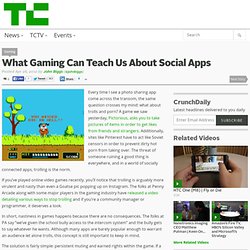

Gamification. What Gaming Can Teach Us About Social Apps. Every time I see a photo sharing app come across the transom, the same question crosses my mind: what about trolls and porn?

A game we saw yesterday, Pictorious, asks you to take pictures of items in order to get likes from friends and strangers. Additionally, sites like Pinterest have to act like Soviet censors in order to prevent dirty hot porn from taking over. The threat of someone ruining a good thing is everywhere, and in a world of socially connected apps, trolling is the norm. If you’ve played online video games recently, you’ll notice that trolling is arguably more virulent and nasty than even a Goatse pic popping up on Instagram.
The folks at Penny Arcade along with some major players in the gaming industry have released a video detailing various ways to stop trolling and if you’re a community manager or programmer, it deserves a look. In short, nastiness in games happens because there are no consequences. The same can be said for trolls in social networks. New Data From Pando Offers A Glimpse Into The Massive Global Growth Of Freemium Gaming. Well, it looks like hardcore gamers would like to have a word with you, social and casual gamers.

Yes, the stories in the media of late have been all about Rovio’s Angry Birds skyrocketing past half a billion downloads, or Zynga and its ilk overtaking social games. Both casual and social games have been growing like gangbusters, but the latest data from Pando Networks reveals some fairly serious growth in the free-to-play gaming industry across the globe. Free-to-play games, just another way of saying “freemium games” are, to clear up any confusion, any game that is free to download and monetized by in-game purchases. Today, in mobile and web apps (and really the consumer web), we are seeing the coming of age of the freemium model and, as a result, advertisers and developers are being forced to find new ways to create revenue and monetize their games, whether that be by way of mobile advertising, virtual goods, avatars, in-game rewards, or incentivized installs.
Social gaming. DC Universe Online gains a million new players with free-to-play transition. A million new players have signed up for Sony Online Entertainment’s massively multiplayer online game DC Universe Online following its transition to a free-to-play business model last month, the company said. DC Universe Online, for PC and PS3, originally required a paid monthly subscription when it launched in January this year. But Sony announced in September that the game was becoming free-to-play, with income being generated through micro-transactions and an optional subscription package. It was a gutsy maneuver, given the potential change in revenues for the title.
This move seems to have paid off, certainly in terms of player numbers. “DC Universe Online’s transition to free-to-play has been welcomed by the community and gamers with heroic enthusiasm. Under the free-to-play business model, DC Universe Online now boasts a three tier access structure , as detailed below: Premium Access: Any player who has spent at least $5 qualifies for the Premium Access level.
Why Do Freemium Games Get Such a Bad Rap? The current hot-button topic in gaming is the freemium business model. Employed in social games like FarmVille and Tap Zoo, freemium means offering access for free, but charging for in-game content (customization, gameplay advantages, etc.). The obvious benefit of this business model is the ability to attract more users with zero cost-of-entry, while generating potentially limitless revenue via consumable items. Both of these factors have made freemium a sustainable and popular approach, especially in the gaming market, where in-app purchases (IAP) account for 72% of App Store revenue. However, freemium games are controversial because they entice players to spend money. Many games, for example, create absurdly long wait times unless the user forks over some credits.
Freemium games convert players into paying customers at wildly varying — but ultimately low — rates. In Defense of Freemium Games with low costs of entry have had a long, proud history. More Ethical Freemium Models.